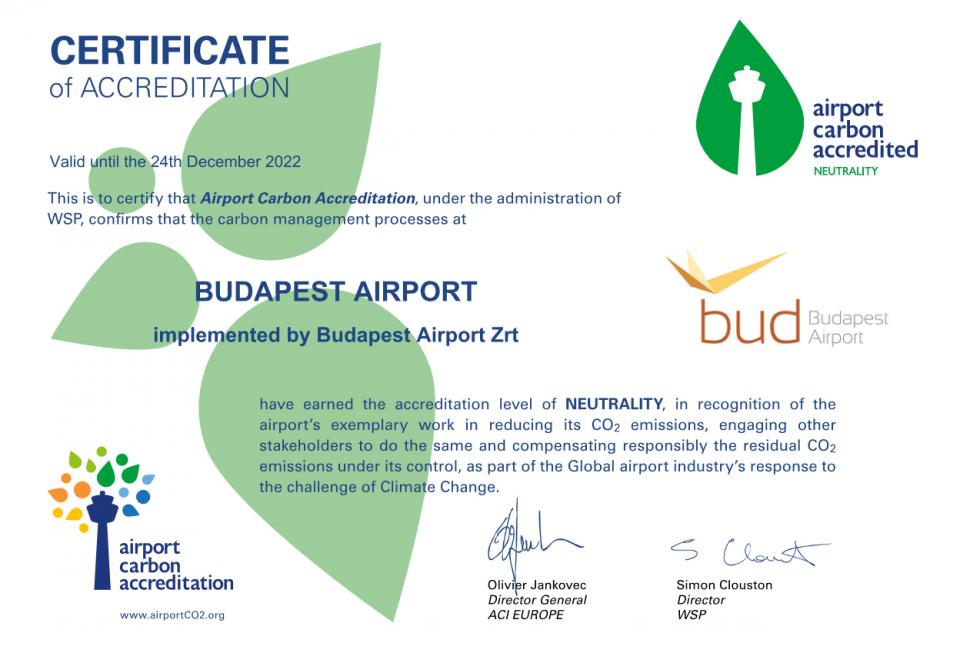Airport Carbon Accreditation, launched by Airports Council International, is the only institutionally-endorsed, global program that assesses the carbon emissions of the world’s airports, through a six-tier certification scheme. The system is based on the fact that airports can be rated 1, 2, 3, 3+ while 4 or 4+ have recently been added, based on their emissions and efforts to reduce emissions, meaning that ACI assesses all airports that join the program voluntarily, regardless of size, category or function.
Despite the operational and financial difficulties caused by the coronavirus epidemic, another 67 airports joined the global effort to reduce carbon emissions this year, bringing the total number of airports currently in the program to 362 worldwide. 22 airports on the African continent, 48 in Latin America and the Caribbean, 50 in North America, 60 in Asia and 182 on the European continent have been awarded carbon accreditation. According to this year’s assessment, only 43 airports in Europe are carbon neutral, like Liszt Ferenc International Airport, and Budapest Airport is one of 58 airports worldwide that currently meet the stringent requirements of carbon neutrality, or level 3+. This means that, thanks to its consistent environmental strategy, the company is working with its airport partners to reduce emissions from its operations as much as possible and neutralizes the remaining emissions, by purchasing carbon credits.
Budapest Airport joined the initiative in 2011, based on its 2010 carbon footprint, and was the first airport in the CEE region to attain carbon neutral accreditation in April 2018. The current certification means that it has now managed to maintain this for the fourth year running. During this ten years, it has halved its direct carbon dioxide emissions and reduced carbon dioxide emissions per passenger to one-third. Budapest Airport is committed to achieve level 4+, thanks to efforts to be implemented in the next few years, placing it amongst the global leaders of the world’s airports in terms of sustainable operation and emissions reduction. Currently, only 13 airports in the world, 7 in Europe, 5 in Asia and 1 in North America, meet the requirements of the highest level, 4 and 4+, set in 2020.

As the airport operator is committed to sustainable growth and environmental protection, in 2019 it also officially joined ACI’s “NetZero by 2050” initiative, a commitment to achieve net zero carbon emissions from its operations by 2050 at the latest. However, Budapest Airport recently announced that with the help of its net emissions reductions scheme, it is working hard to reduce its net emissions to zero up to 15 years ahead of the current deadline of 2050, by 2035.
Climate change is a real threat that can only be tackled by joining forces and working together. The recognition of our achievements means that we, the airport community, are not just talking about it, but are actively taking action for our future,
said Chris Dinsdale, the CEO of Budapest Airport.
He added: We are constantly working to reduce emissions at the airport, moving forward step by step, with energy efficiency measures and the use of renewable energy, to achieve the next level in our carbon accreditation and net zero carbon emissions at the end of the process. The time for excuses is over. Specific action is needed, with every company, regardless of the industry, playing a responsible role.
In line with its sustainability goals of zero carbon emissions, energy efficiency and transport developments, Budapest Airport also joined the STARGATE consortium this year, as part of which it undertook, amongst other things, to develop and put in place a cloud-based, paper-free air cargo handling system. The project, led by Brussels Airport, has secured nearly 25 million euros of support from the European Commission, within the framework of the Green Deal program.





